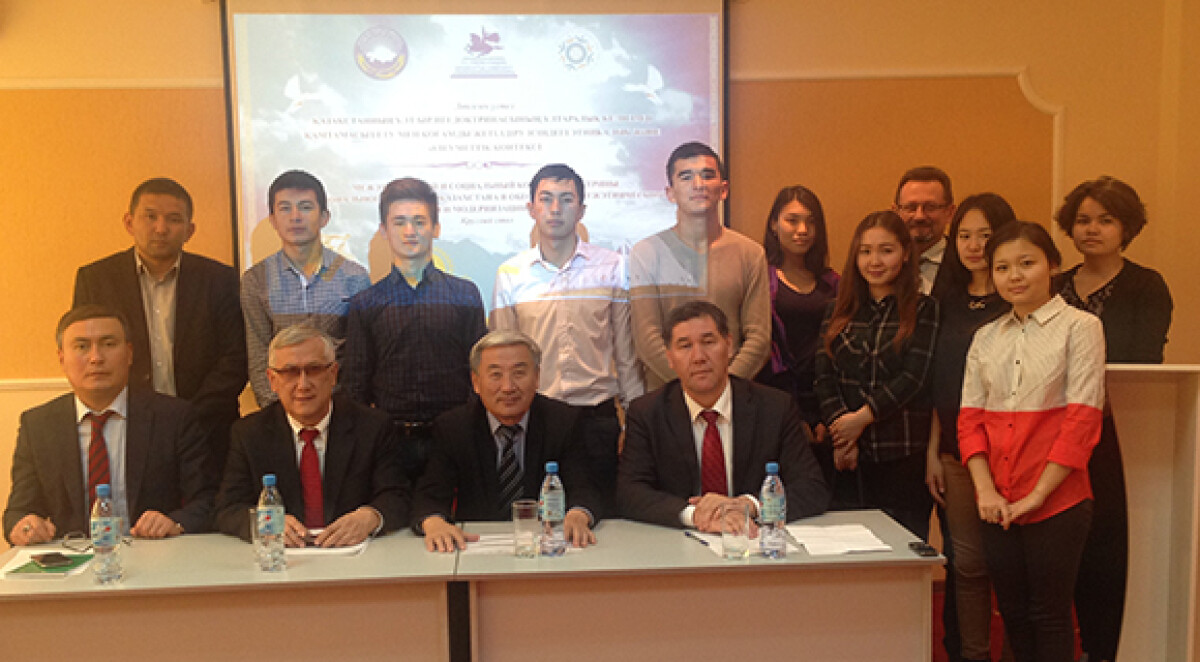
A round table held on October 20, 2015 was dedicated to the issues of forming Kazakhstan’s identity, education of new patriotism of Kazakhstan among the younger generation, understanding of inter-ethnic and social context of the National Unity Doctrine of Kazakhstan in ensuring inter-ethnic harmony and modernization of society.
As it is known, «National Unity Doctrine of Kazakhstan» was adopted in 2010 after long-term and public discussion of the project and is one of the crucial and rare documents aimed at social modernization of society and ensuring of further peace and harmony in the country.
The event was organized by the Department of APK of the Faculty of Social Sciences, UNESCO Department on ethnic and religious tolerance of APK L.N.Gumilyov ENU, Ukrainian center for Science and Culture at Embassy of Ukraine in RK and Trade Union of L.N.Gumilyov ENU. Scientific and methodological assistance was provided by the faculty of Social Sciences of Eurasian University. The representatives of the scientific and expert community of historians and contiguous social-humanitarian sciences of Kazakhstan, foreign countries, undergraduate and graduate students of the capital were the participants of the round table.
The welcome speech by the Chairman of the Trade Union of L.N.Gumilyov ENU, associate professor Zhanaidarov Talgat Zhanaidarovich addressed to the students and graduates was concerned about the necessity to understand the responsibility of each citizen of the country for the preservation of inter-ethnic peace and harmony in the country.
Gadilbek Shalakhmetov, academician of RANS, head of UNESCO Department on inter-ethnic and interreligious tolerance of L.N.Gumilyov ENU drew the attention of the audience on the importance of the media in covering the issues of inter-ethnic and interfaith relations when each careless word can cause unwanted effects. Shavkat Ismailov, the Chairman of Kyrgyz National Cultural Center «Astana — Kyrgyzstan» in the report «Experience of activity of Kyrgyz public associations on realization of «National Unity Doctrine of Kazakhstan» emphasized that «Today many foreign neighboring states actively adopt experience of Kazakhstan on strengthening inter-ethnic peace and harmony, including in my ancestral land Kyrgyzstan».
A speech by Akbota Zholdasbekova, professor of UNESCO department caused a rapid recovery, which covered enduring experience in the field of inter-ethnic relations of Iran, Pakistan and India in detail, summarizing that «nevertheless, Kazakhstan differs favorably on regional and Eurasian scales in its policy of consolidation and unity of the nation on the basis of civil identity». Petr Tokar, visiting professor of Department of Political Science of L.N.Gumilyov ENU from Ukraine explained the policy of maintaining peace and harmony on the experience of his historic homeland: «The World is fragile, it should be protected. The entire world must follow the example of Kazakhstan, where representatives of more than 130 nations and nationalities, consolidated around Kazakh people, feel comfortable».
Bakytzhan Orazaliyev, Director of the scientific library of L.N.Gumilyov ENU, candidate of philosophical sciences, a veteran of war in Afghanistan noted that: «Today Kazakhstan is presented as an island of peace and harmony. The words „Kazakhstan“, „Astana“ and „Nazarbayev“ are associated with stability, diversity, hospitality and respectful attitude to representatives of other cultures and civilizations in the world. These qualities are formed on mental and genetic levels with our citizens. Therefore, such Doctrine has been adopted, that is the reason, why we held OSCE Summit in 2010 and we plan to hold „EXPO-2017“ and the World Universidade in 2017».
The organizers of the round table arranged a book exhibition and presentation of the 12th issue of the International scientific-popular magazine «Mangi el», where designated theme also occupies a significant place.
The work of the round table was implemented on the following directions: the history of the adoption of National Unity Doctrine of Kazakhstan; the foreign experience of adopting such documents; the Leader of the Nation N.A.Nazarbayev and Kazakhstan’s model of peace and harmony; A role and place of the Doctrine in regulation of inter-ethnic and inter-faith relations as a key document in the work of Assembly of people of Kazakhstan; the national idea «Mangilik el» and National Unity Doctrine; «A country of the Great steppe» and a long history of friendship of representatives of different nations in Kazakhstan; formation of «New patriotism of Kazakhstan» among youth; unique language policy and language processes in Kazakhstan; practical implementation of the National unity Doctrine on the example of work of ethnic cultural centers and departments of APK.
A resolution with valuable recommendations and proposals including addressed to the public authorities was adopted according to the results of the round table. The organizers plan to publish a collection of reports.
